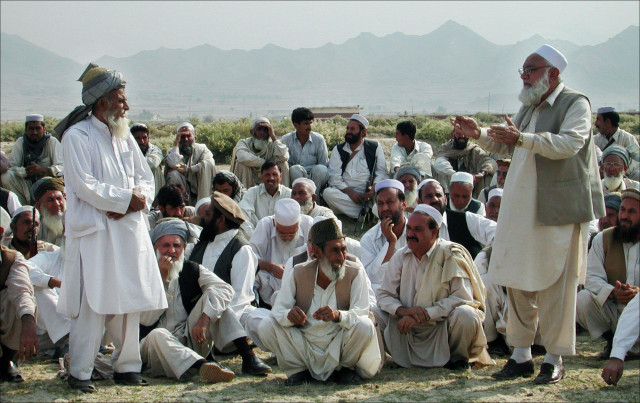Tribal council fails to reach consensus over dispute
Grand jirga to be held with all tribal leaders to resolve dispute

A tribal council known as a jirga decide important matters of the citizens.PHOTO: AFP
The issue will now be debated on February 15 by a grand jirga with representation from all the major tribes of Kohistan.
Tribal elders from Palas and Dasu met at Jinnah Bagh in District Abbottabad on Sunday.
JUI-F and PML-N parliamentarians Abdul Sattar Khan and Maulana Asmatullah, as well as Palas Kolali Committee members attended the unfruitful meeting on Sunday.
Asmatullah said Palas Tehsil consists of 16 UCs with 500 villages and a population of 175,000, while Pattan Tehsil has 10 UCs with 94 villages and a total population of 100,000.
This, he said, was proof enough that it was the right of the people of Palas to have the district headquarters in their area.
He added that houses on a newly constructed administration block covering 20 canals were planned in Palas, while government resources would go to waste in Pattan.
The parliamentarian said the tribal elders of Pattan intentionally blocked roads to deny access to the people of Palas as well as a social boycott in opposition of the Pattan headquarters.
He added that the culture and language of the two tehsils were polarised.
He demanded that the government either declare Palas the district headquarters or allow the people of Palas to remain with Dasu – the district headquarters of Upper Kohistan.
He explicitly said that no other options would be acceptable.
Sattar Khan, however, said that he would give his full support to Palas Tehsil if they were to agree to an amicable and non-violent solution.
Support for jirgas and panchayats
Moreover, he did not agree with the idea that Palas Tehsil should become part of Upper Kohistan as it would create problems for villagers.
Afzal Kohistani, a human rights activist, called for the issue to be resolved once and for all to end the acrimony which has developed between residents of the two tehsils over the past few years.
He added that the only way to gain the consent of the people of Palas would be if the provincial government announce the establishment of an equal number of offices in both tehsils.
"If [the government] agrees, then two sides would end their opposition and help in the smooth implementation of the government's plan that was further endorsed by High Court and the apex court," he said.
He requested that everyone should avoid political manoeuvring at the cost of the development of Kohistan, which had been neglected since the country's inception.
He reiterated that Palas becoming a part of upper Kohistan was not a viable option, as citizens would have to cross the Pattan bridge to get to Dasu, which would be very expensive for them.
He urged the political leadership of Kohistan to desist from using religion for their own personal interests.
Meanwhile, some tribal elders from Palas who previously supported Asmatullah's demand were now backing the solution presented by Kohistani and asked the two MPAs to discuss the issue during the next grand jirga.
Malik Fazlu of Kolai, Malik Asarjan, and Malik Aurangzeb of Palas were in favour of the division of the offices of the new headquarters.
Moreover, the next tribal council would be headed by Sattar.
Previously, the provincial government issued a notification which split Lower Kohistan into two tehsils.
The notification stated that Pattan would be the headquarters of the seventh district of Hazara division on February 15, 2014.
It went on to state that a deputy commissioner and district police officer are to be posted as administrative officers.
Notwithstanding, the people of Palas opposed this decision and demanded that Palas be made the new headquarters.
Subsequently, citizens of the tehsil blocked the Karakoram Highway on several occasions as well as staging protests outside the Abbottabad bench of the Peshawar High Court (PHC).
The PHC Abbottabad bench had earlier granted a stay against the bifurcation and dismissed the petition filed by tribal elders from Palas on June 24, 2014, upholding the decision of the government.
Three weeks ago, the Palas Kolia Committee moved the Supreme Court again and saw the decision go against them again.













COMMENTS
Comments are moderated and generally will be posted if they are on-topic and not abusive.
For more information, please see our Comments FAQ